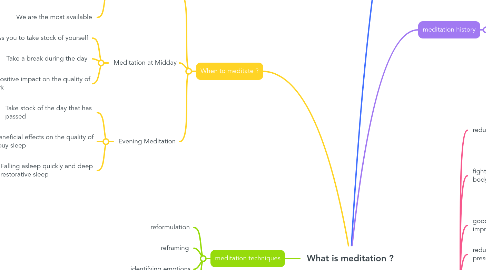
1. Different types of meditation
1.1. Mindfulness meditation
1.1.1. Paying attention to the present moment, thoughts, emotions, physical sensations and the environment.
1.2. Zen meditat)ion (or Zazen)
1.2.1. Comes from Buddhist culture. Take a position similar to the Buddha statues to be calmer.
1.3. Vipassana meditation
1.3.1. Based on paying attention to the five senses (sight, hearing, taste, smell and touch) and the mind
1.4. Guided meditation
1.4.1. Meditations led by a teacher or an experienced meditator.
1.5. Transzendentale meditation
1.5.1. A simplified Indian meditation technique adapted to the Western market.
1.6. Mantra meditation
1.6.1. A mantra is a word or phrase repeated to help focus the mind during meditation.
1.7. Meditation in moving
1.7.1. Yoga, Tai-chi, Qi-cong …
2. meditation history
2.1. at the beginning meditation was a way to acces knowledge ( 2000 before J-C).
2.2. It's actually impossible to know the exact date of origin of meditation. The links between nature and man seems to have always existing. We had to wait until the arrrival of writting to know that meditation was most present in Chinese and Indian societies.
2.3. There is two big movements at the origin of meditation : Taoisn, well before Buddhism, this movement search for harmony and peace between the universe and the Human and the communication with nature. The Taoist meditation consists of slow gesture, deepening breath to free the circulation of air in the body. The second : Buddhism is not the beginning of meditation But it is mostly know for the Lotus position develloped by Buddha Siddhartha Gautam. We use this meditation as a means of liberation from suffering.
3. Benefits
3.1. reduces stress and anxiety
3.2. fights age-related damage to the body and increases life expectancy
3.2.1. prevents age-related reduction in brain size
3.2.2. reduces age-related memory loss
3.2.3. combats cell ageing
3.3. good for the internal clock and improves sleep
3.4. reduces heart rate and high blood pressure
3.5. fights against depression
3.6. has anti-inflammatory properties
3.7. improves concentration and attention
3.8. relieves chronic pain
3.9. boosts the immune system
3.10. combats feelings of loneliness
3.11. Improves self-awareness and self-knowledge
3.12. generates kindness and empathy
3.13. helps combat addiction
3.14. improves mood and mental well-being
3.15. improves resilience and emotional intelligence
3.16. improves creativity
3.17. reduces the risk of heart disease and incurable illnesses
3.18. helps treat premenstrual syndrome and menopausal symptoms
4. Definition of medidation
4.1. A number of mental and physical practices that focus on the breath, a particular object, characteristics such as thought, emotions and body sensations.
5. Different ways of meditating
5.1. Several applications like "Petit Bambou"; "Mind" ...
5.2. Netflix series : "Headscape"
5.3. practice cardiac coherence with the "RespiRelax" app.
5.4. meditate alone meditate or with a mediator
6. meditation techniques
6.1. reformulation
6.2. reframing
6.3. identifying emotions
6.4. open questions
7. When to meditate ?
7.1. Morning meditation
7.1.1. Start the day peacfully
7.1.2. Our mind is more suited to meditation
7.1.3. We are the most available
7.2. Meditation at Midday
7.2.1. Allows you to take stock of yourself
7.2.2. Take a break during the day
7.2.3. A positive impact on the quality of work
7.3. Evening Meditation
7.3.1. Take stock of the day that has passed
7.3.2. Beneficial effects on the quality of youy sleep
7.3.3. Falling asleep quickly and deep restorative sleep
